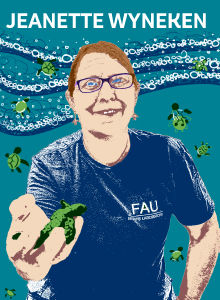
Trailblazers in Their Field
By Lynn Laurenti
With the recent launch of the FAU chapter of the Association for Women in Science (AWIS), we turn the spotlight on some of the transformational work that is being carried out by women researchers at the university and efforts being made to recruit and retain women faculty, particularly in science, technology, engineering and mathmatics (STEM).
FAU’s ADVANCE Institutional-Transformation Catalyst program received a $250,000 National Science Foundation grant aimed at recruiting and retaining women faculty, particularly in the STEM areas. Originally awarded in 2016, the grant is now in its final year.
While the focus of the ADVANCE program is primarily on building STEM faculty, “the PI team has broadened the scope to include all women and underrepresented minority faculty from all disciplines at the university,” said Russell Ivy, Ph.D., senior associate provost for academic affairs. Institutional improvements made toward this end include reshaped mentoring activity for teaching, research and preparation for leadership roles as well as a strong diversity sensitivity training program for search committees.
“We feel we have made important inroads to ensuring attracting, success and retention of diverse faculty that will be sustained long after the grant ends,” Ivy said.
This new FAU chapter of AWIS, led by Daniela Nikolova, Ph.D., and Julie C. Servoss, MD, aligns with ADVANCE program, and brings the university into a global network of institutions and organizations working to advance women in the STEM fields.
Nikolova is a senior instructor in the Department of Mathematical Sciences in the Charles E. Schmidt College of Science. Servoss is an associate professor of integrated medical science in the Charles E. Schmidt College of Medicine.
While the full scope of our women researchers’ activities would take a book to describe, here are a few highlights of trailblazing contributions being made by some up-and-coming members of the FAU research community.
Andia Chaves Fonnegra
Andia Chaves Fonnegra, Ph.D., is an assistant professor of biology in the Harriet L. Wilkes Honors College and manager of the Laboratory of Integrative Marine and Coastal Ecology at Harbor Branch Oceanographic Institute. She has been awarded a 2019 Early-Career Research Fellowship by the Gulf Research Program of the National Academies of Sciences, Engineering and Medicine. Her research focuses on improving the management of marine ecosystems by determining how ecological interactions are altered by anthropogenic activities and global impacts such as climate change and pollution.
Christine E. Spadola
Christine E. Spadola, Ph.D., an assistant professor in the Phyllis and Harvey Sandler School of Social Work in the College for Design and Social Inquiry, is the lead author of a multi-institutional study on the effects of evening consumption of alcohol, caffeine and nicotine on the sleep of African Americans. Collaborating institutions include Brigham and Women’s Hospital, Harvard University’s T.H. Chan School of Public Health, Harvard Medical School, Emory University, the National Institutes of Health and the University of Mississippi Medical Center. The study, published in the journal Sleep, investigated more than 5,000 nights of data and found that nicotine and alcohol consumed within four hours of sleep had a negative impact on sleep, with nicotine associated with 42 minutes lower sleep duration. The authors found no general association between consumption of caffeine within four hours of bedtime and sleep difficulties. Read more about Spadola on page 5.
Johanna Kowalko, Ph.D., assistant professor of biology in the Harriet L. Wilkes Honors College, is co-principal investigator of a study that recently won a $1.1 million grant from the National Science Foundation to further position the blind Mexican cavefish as a research model for understanding evolution and human disease. Read more about Kowalko on page 24.
Sarah Du
Sarah Du, Ph.D., associate professor in the College of Engineering and Computer Science, directs the Living Devices and Biosensors Lab, which seeks new methods to advance diagnosis and treatments for infectious, blood and vascular diseases. She and her FAU colleagues, in collaboration with researchers from the Massachusetts Institute of Technology and the Nanyang Technological University in Singapore, developed a novel way to measure how mechanical fatigue affects biological cells. Results of their study, published in the Proceedings of the National Academy of Sciences, provide insights into accumulated membrane damage during blood circulation, paving the way for further investigations of the eventual failure of red blood cells and the mechanism that causes their destruction in various blood disorder pathologies such as sickle cell anemia.
Veterans Paving the Path
FAU is also the home of a number of women researchers who are acknowledged leaders in their fields.
 Janet Robishaw, Ph.D., is senior associate dean for research
and graduate education, and professor and chair of the Department
of Biomedical Science in the Charles E. Schmidt College of Medicine.
Her research identifies genetic risk factors for common diseases,
which can then be developed into novel therapeutic targets for prevention
or treatment of these conditions.
Janet Robishaw, Ph.D., is senior associate dean for research
and graduate education, and professor and chair of the Department
of Biomedical Science in the Charles E. Schmidt College of Medicine.
Her research identifies genetic risk factors for common diseases,
which can then be developed into novel therapeutic targets for prevention
or treatment of these conditions.
In addition to earning numerous distinctions and awards, Robishaw's research appears in more than 100 peer-reviewed papers and has attracted more than $20 million in National Institutes of Health funding. Her administrative focus includes growing the existing research program, increasing its scope with the addition of new faculty hires and expanding its impact through the pursuit of collaborative opportunities with regional, national and international partners. Her efforts have helped propel the College of Medicine into the top 100 in the 2020 U.S. News & World Report ranking.
 Jeanette Wyneken, Ph.D., a professor of biological sciences in
the Charles E. Schmidt College of Science, and director of the
FAU Marine Lab at Gumbo Limbo Environmental Complex, has
spent the last three decades making many major contributions
to the study of marine turtles, including successfully
tracking the cross-Atlantic route young turtles take from
their place of hatching to offshore nursery areas. This
period had previously been called their
“lost years” because of lack of
knowledge about where the turtles went and how long
their journey took.
Jeanette Wyneken, Ph.D., a professor of biological sciences in
the Charles E. Schmidt College of Science, and director of the
FAU Marine Lab at Gumbo Limbo Environmental Complex, has
spent the last three decades making many major contributions
to the study of marine turtles, including successfully
tracking the cross-Atlantic route young turtles take from
their place of hatching to offshore nursery areas. This
period had previously been called their
“lost years” because of lack of
knowledge about where the turtles went and how long
their journey took.
 Ruth Tappen, Ed.D., Christine E. Lynn Eminent Scholar in
the Christine E. Lynn College of Nursing, and founder of the
Louis and Anne Green Memory and Wellness Center, spent decades
helping find ways to improve the lives of older adults with cognitive
disorders and assist their caregivers. She has taken a leadership role
in a host of interdisciplinary studies, including one designed to
reduce unnecessary hospitalizations of nursing home residents that
was funded by the National Institutes of Health. Her textbook
Advanced Nursing Research: From Theory to Practice won the 2018
Book of the Year Award from the American Journal of Nursing.
Ruth Tappen, Ed.D., Christine E. Lynn Eminent Scholar in
the Christine E. Lynn College of Nursing, and founder of the
Louis and Anne Green Memory and Wellness Center, spent decades
helping find ways to improve the lives of older adults with cognitive
disorders and assist their caregivers. She has taken a leadership role
in a host of interdisciplinary studies, including one designed to
reduce unnecessary hospitalizations of nursing home residents that
was funded by the National Institutes of Health. Her textbook
Advanced Nursing Research: From Theory to Practice won the 2018
Book of the Year Award from the American Journal of Nursing.
